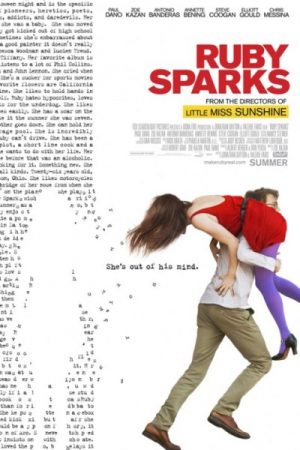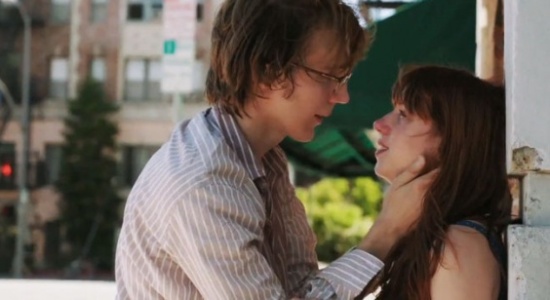
It strikes me as a fair bit of irony that Ruby Sparks, a fictional character even within her own story, would come across as the most realistic woman I’ve even seen in film. Sure, she’s born out of a dream, one that’s been cropping up in an increasing number of indie rom-coms: the querky, bohemian ingénue who needs the love of a quiet, insecure man to save her from herself. However, as in the real world, it doesn’t take long before she realizes there’s more to existence than fulfilling another person’s egocentric fantasy.
I’m getting ahead of myself. Written by Zoe Kazan, who also plays the titular character, Ruby Sparks tells of a neurotic author, Calvin (Paul Dano), who, after years of writer’s block, dreams up the ideal woman and starts describing her in his new novel. With every page, he falls more and more in love with his creation until one day, through some unexplained miracle, she shows up in his house. At first, their love affair feels like it ought to star Zooey Deschanel or Amy Adams, but real-life concerns soon rear their ugly heads as Ruby decides she wants a job, friends, and ambitions of her own.
Calvin designed her that way, you see, taking pride in the fact he didn’t make up a Playboy bunny as his brother Harry (Chris Messina) surely would have, what with all his posturing about boobs and getting laid. However, we get the sense that, given the same opportunity, the jock would actually put away the typewriter (delightfully used as a symbol of hipster immaturity) and make breakfast for his loving wife Susie (Tony Trucks), whom he sometimes doesn’t recoginise, finds mean for no reason, and appreciates just the same because, hey, she’s a person.
It’s hard not to love Harry, whose good spirit conceals a deep heart and natural wisdom. Consider his unassuming joy at seeing his mother Gertrude (Annette Bening) find happiness with Mort, a warmhearted hippie carver played with much hilarity by Antonio Banderas. In contrast, Calvin has trouble accepting this new side of a woman who “used to wear polo shirts”. This resentment comes a bit unexpectedly, seeing as Ruby shares many of her traits, but our hero has a two-dimensional picture of how his mom should behave and views any deviation as a betrayal.

Having been bestowed both smarts and intuition, Ruby notices all of these things and begins to see through Calvin’s intellectual veneer, growing increasingly lonely as the honeymoon period fades. She takes active steps to distance herself. He responds by abusing the written word, demonstrating how, for all his talk of love and perfection, he still perceives her as a plaything. The resulting scenes had me laughing out loud as much for their deliberate absurdity as for their troubling familiarity. Here is a rare romantic comedy that actually understands relationships, even the dysfunctional ones.
In a way, Ruby Sparks delivers a perfect, oddly constructive criticism of a chauvinistic mindset that so often masquerades as enlightenment in artistic circles. As his ex (Deborah Ann Woll) points out, Calvin is a narcissist who thinks himself too sensitive to succumb to misogyny, but his idea of woman turns out as empty as the nudie pictures in adult magazines or, to be fair, the image his gushing female fans have of him. That the movie can paint such a harsh picture without diminishing its characters or resorting to bleak, one-sided diatribes speaks both to its worth and to that of Kazan’s message.
In fact, I’d have recommended Ruby Sparks based on its charm and wit alone, but one scene in particular reminded me why we need independent films like this. The moment draws from such raw, powerful emotion that I suspect most Hollywood studios would’ve commissioned an alternate climax for fear audiences might find it too challenging. I could barely look at the screen myself, partly because of the unflinching darkness, partly because the characters felt like real human beings to me. The movie could have made its point without this sequence, but directors Jonathan Dayton and Valerie Faris knew that it shouldn’t. It’s the sort of decision that can make a thoughtful piece of fiction feel as real as, well, Ruby Sparks.






Recent Comments